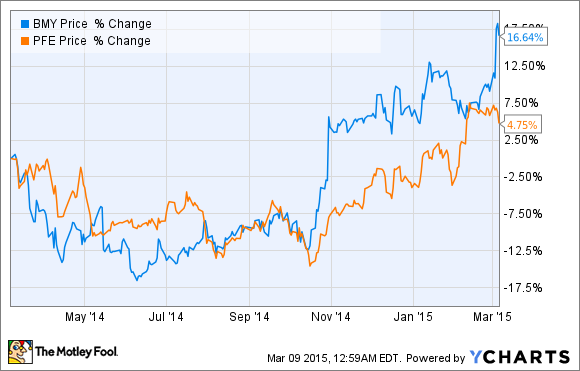
Source: Lendingmemo.com
Big pharma stocks tend to be favorites among income investors because they generally have stable cash flows, high profit margins, and often raise their dividends on a regular basis. The ongoing patent cliff, though, has acted like a dark cloud on this group of income-generating stocks, putting their cash flows and dividends at risk.
Pfizer (PFE +0.75%) and Bristol-Myers Squibb (BMY +0.05%) are two well-known dividend stocks in the healthcare sector that have taken a major hit from the patent cliff. Pfizer, for instance, saw annual revenues drop by 4% and its diluted EPS slip by a staggering 55% last year. Bristol, on the other hand, is forecasting a roughly 5% decline in revenue, and up to a 16% drop in diluted EPS, this year.
Despite these troubling numbers, we have witnessed both companies incrementally increase their dividends in recent quarters, and undergo radical changes to their underlying businesses to stave off the negative impacts of the patent cliff. With this in mind, let's consider which dividend stock offers the better long-term opportunity going forward.
Pfizer looks set to break apart
Pfizer's days as a healthcare behemoth might be coming to an end, and that's a good thing for investors in many ways.

Source: Wikimedia
The drugmaker has been struggling to generate top or bottom-line growth lately because of the loss of exclusivity for Celebrex and Lipitor -- in spite of the strong commercial performance of newer products like its pneumonia and meningitis vaccine Prevnar-13.
Starting in 2013, the company's management began a major restructuring process, leading to the IPO of its animal healthcare unit in the form of Zoetis, a reorganization of its business segments, and the purchase of generic injectable drugmaker Hospira.
To make a long story short, we will probably see Pfizer split into two companies in the near future. Specifically, the Street is expecting Hospira to be paired with the company's legacy products, allowing the drugmaker to unlock the value of its new growth products via a separate business. Before doing so, however, we may end up seeing Pfizer's growth products being coupled to another pharma company, with Actavis being the name most often floated as a possible buyout target.
While there's no way to know how a dividend payment will play out following a breakup, Pfizer has repeatedly signaled that rewarding shareholders is a top priority. In fact, management recently increased the dividend by 7.6% to $0.28 per share, giving the stock a 3.3% yield at current levels. So it's more than likely that both entities would offer something in the way of a dividend.
Bristol is becoming a leader in the field of immuno-oncology
Bristol has been making wholesale changes to its business of late -- exiting the profitable diabetes market, for example, in favor of the speculative field of immuno-oncology. Although immunotherapies are predicted to generate upward of $35 billion in sales by 2020, this promising area has been plagued by clinical setbacks throughout its history.
Bristol's risky bet nonetheless appears to be paying off, with its PD-1 inhibitor, Opdivo, winning its first regulatory approval for advanced melanoma late last year, and a second approval for squamous nonsmall cell lung cancer, or NSCLC, a week ago.

Source: Bristol
Taken together, these two indications are expected to generate about $1 to $2 billion in sales for the drug, and total peak sales are forecast to top $5 billion, if Bristol can gain additional approvals for various types of blood and lung cancers. That said, there is a good chance that $5 billion is actually a low ball figure, given that Opdivo is presently in clinical trials for over 20 different tumor types.
Like Pfizer, Bristol has slowly been edging its dividend higher for a long period of time, now paying out $0.37 a share on a quarterly basis. The company's current yield of 2.27% thus puts in right in line with the sector average, but well below Pfizer's monster yield.
Which is the better long-term dividend stock?
Both of these companies have made excellent strides toward returning to the growth track. But Bristol's stock has soared higher in anticipation of Opdivo's commercial launch, while Pfizer's has stagnated due to the lack of clear-cut growth catalysts:
Bristol's shares are thus trading at a stately forward price-to-earnings ratio of 28, whereas Pfizer comes in at a much more reasonable 15. Given that Pfizer offers a higher yield than Bristol, looks comparatively undervalued relative to its peers, and appears close to creating more value for shareholders via a breakup, you may want to dig deeper into this top healthcare name. All told, Pfizer's valuation prospects stack up favorably against Bristol, and I'd say that makes it a more compelling long-term buy.








